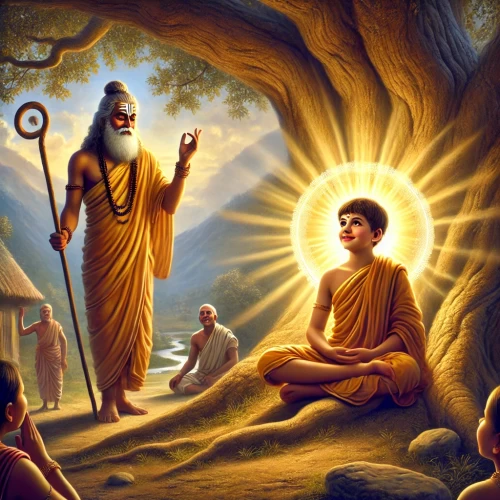Story of Hastamalaka

In the village of Srivalli (in the present day Udupi district of Karnataka; near Chitrapur), a very devout village with more than 2000 Brahmins with Vedic rituals practiced without miss every day, there lived a bright and devout Brahmin named Prabhakara. He had a young son aged thirteen with pleasant features, but he was very strange in his ways, he never spoke a word to anyone, so they assumed that he must be dumb, he was disinterested in the activities that children of his age were, so they assumed he must be intellectually challenged. Prabhakar lived in pain seeign his son in this state every day. The boy would just sit and do nothing.
One day Prabhakara heard that the great Adi Shankaracharya was travelling with his batallion and was passing through villages near by. Prabhakara went to Shankara with a basket of fruits, paid obeisance by prostrating in front of the realized one. Prabhakara requested that the great one visit his home and bless his intelelctually challenged son.
Shankara agreed ang they all visited Srivalli to see Prabhakara's son. Seeing Adi Shankaracharya walking towards him, the boy got up and prostrated in reverence. Shankara looked at the boy and sensed that the boy was a spiritually very advanced soul.
"Why don't you talk?" Shankara asked the boy.
"About what?" replied the boy to everyone's surprise. Those were the first words he ever spoke. "'That which is' can not be grasped through words, words are distractions."
"Who are you?" Shankara further poked, to invoke an answer that would let everyone know how great the boy was.
The boy composed 12 verses in Sanskrit summarizing the nature of SELF, known as Hastamalaka Stotram. Shankaracharya was so impressed that he himself wrote commentary on the verses of his future disciple.
Adi Shankara asked the parents to send the boy with him as he would be too disinterested in the ways of the world. The parents realized that and agreed.
The boy became the principal disciple of Adi Shankaracharya. He was appointed the first Jagadguru of the Dvāraka Pīṭhaṃ, one of the four monasteries established by Adi Shankara.
The boy was named Hastamalaka as he had grasped the knowledge of the self as easily as the Amalaka fruit (Sanskrit: आमलकी; Indian gooseberry) that's already in one's palm.
Some of Shankara's disciples thought Hastamalaka was a worthy candidate to write sub-commentaries on Shankara's works , given the depth of his realization. Shankara let his other disciples write sub-commentaries. Shankara believe it would be too mundane for someone so deeply immersed in Brahman.
Hastamalaka also founded Idayil Matham in Thrissur, Kerala. He is believed to have written "Vivekamanjari"
हस्तामलकस्तोत्रम्
कस्त्वं शिशो कस्य कुतोऽसि गन्ता
किं नाम ते त्वं कुत आगतोऽसि ।
एतन्मयोक्तं वद चार्भक त्वं
मत्प्रीतये प्रीति विवर्धनोऽसि ॥ १॥
हस्तामलक उवाच ।
नाहं मनुष्यो न च देव-यक्षौ
न ब्राह्मण-क्षत्रिय-वैश्य-शूद्राः ।
न ब्रह्मचारी न गृही वनस्थो
भिक्षुर्न चाहं निजबोध रूपः ॥ २॥
निमित्तं मनश्चक्षुरादि प्रवृत्तौ
निरस्ताखिलोपाधिराकाशकल्पः ।
रविर्लोकचेष्टानिमित्तं यथा यः
स नित्योपलब्धिस्वरूपोऽहमात्मा ॥ ३॥
यमग्न्युष्णवन्नित्यबोध स्वरूपं
मनश्चक्षुरादीन्यबोधात्मकानि ।
प्रवर्तन्त आश्रित्य निष्कम्पमेकं
स नित्योपलब्धिस्वरूपोऽहमात्मा ॥ ४॥
मुखाभासको दर्पणे दृश्यमानो
मुखत्वात् पृथक्त्वेन नैवास्ति वस्तु ।
चिदाभासको धीषु जीवोऽपि तद्वत्
स नित्योपलब्धिस्वरूपोऽहमात्मा ॥ ५॥
यथा दर्पणाभाव आभासहानौ
मुखं विद्यते कल्पनाहीनमेकम् ।
तथा धी वियोगे निराभासको यः
स नित्योपलब्धिस्वरूपोऽहमात्मा ॥ ६॥
मनश्चक्षुरादेर्वियुक्तः स्वयं यो
मनश्चक्षुरादेर्मनश्चक्षुरादिः ।
मनश्चक्षुरादेरगम्यस्वरूपः
स नित्योपलब्धिस्वरूपोऽहमात्मा ॥ ७॥
य एको विभाति स्वतः शुद्धचेताः
प्रकाशस्वरूपोऽपि नानेव धीषु ।
शरावोदकस्थो यथा भानुरेकः
स नित्योपलब्धिस्वरूपोऽहमात्मा ॥ ८॥
यथाऽनेकचक्षुः-प्रकाशो रविर्न
क्रमेण प्रकाशीकरोति प्रकाश्यम् ।
अनेका धियो यस्तथैकः प्रबोधः
स नित्योपलब्धिस्वरूपोऽहमात्मा ॥ ९॥
विवस्वत् प्रभातं यथा रूपमक्षं
प्रगृह्णाति नाभातमेवं विवस्वान् ।
यदाभात आभासयत्यक्षमेकः
स नित्योपलब्धिस्वरूपोऽहमात्मा ॥ १०॥
यथा सूर्य एकोऽप्स्वनेकश्चलासु
स्थिरास्वप्यनन्यद्विभाव्यस्वरूपः ।
चलासु प्रभिन्नः सुधीष्वेक एव
स नित्योपलब्धिस्वरूपोऽहमात्मा ॥ ११॥
घनच्छन्नदृष्टिर्घनच्छन्नमर्कम्
यथा निष्प्रभं मन्यते चातिमूढः ।
तथा बद्धवद्भाति यो मूढ-दृष्टेः
स नित्योपलब्धिस्वरूपोऽहमात्मा ॥ १२॥
समस्तेषु वस्तुष्वनुस्यूतमेकं
समस्तानि वस्तूनि यन्न स्पृशन्ति ।
वियद्वत्सदा शुद्धमच्छस्वरूपं
स नित्योपलब्धिस्वरूपोऽहमात्मा ॥ १३॥
उपाधौ यथा भेदता सन्मणीनां
तथा भेदता बुद्धिभेदेषु तेऽपि ।
यथा चन्द्रिकाणां जले चञ्चलत्वं
तथा चञ्चलत्वं तवापीह विष्णो ॥ १४॥